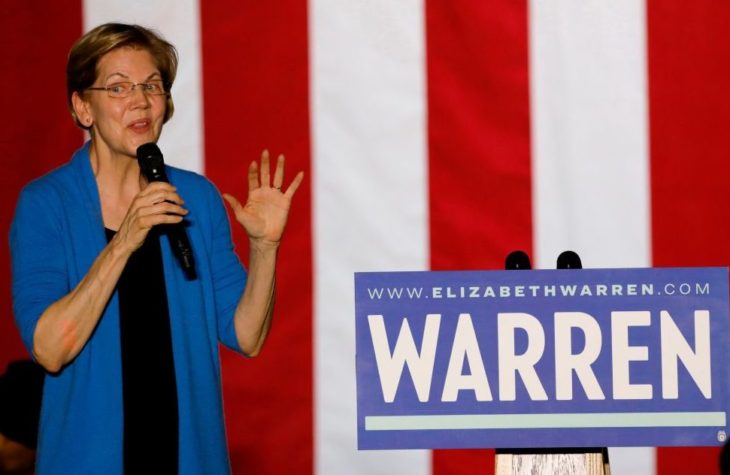Has Warren had the last laugh?
She’s got a plan for that! Nevertheless, she persisted! Pick your cringey Elizabeth Warren tagline. The last-ditch inclusion of something resembling a wealth tax in the Democrats’ Build Back Better reconciliation package has some claiming that the Massachusetts law professor-turned-senator who made a similar proposal the centerpiece of her 2020 presidential bid is having the last laugh.
Adam Jentleson, a former top congressional aide and Warren campaign alum, told the Washington Post that people are gravitating towards the proposal because “it is extremely good.” A more honest explanation would be that Democrats are desperate to find something — anything — they can agree on. As America’s governing party rushes to meet a self-imposed deadline to have a framework for the reconciliation bill in place this week, the only standard for any revenue-raising proposal is now whether it has the support of 50 senators.
But before the Warren fans let out a collective “Yas Kween!”, there are a few things to consider.
First, it is far from clear that the idea has the support it needs. Moderate holdouts Kyrsten Sinema and Joe Manchin are yet to say what they think about the proposal. Meanwhile, Richard Neal, head of the House Ways and Means Committee, sounds cool on the idea. The idea is only being floated because of Sinema’s opposition to Neal’s proposed hike of corporate tax rates. Is this idea any more popular among Democratic lawmakers? We don’t know.
Second, the mooted wealth tax is a far cry from Warren’s idea of an annual tax of two cents on every dollar of the wealthy’s assets. In fact, it’s not necessarily accurate to call this a wealth tax. The proposal, which is being pushed by Oregon senator Ron Wyden, targets billionaires’ unrealized gains rather than their assets as a whole. As the Wall Street Journal’s Rich Rubin explains, if a billionaire doesn’t add to his net worth in a given year, he doesn’t pay any extra tax.
Third, the idea brings with it all manner of technical, political and legal complications that may mean it is dead on arrival. It’s far from clear that taxing unrealized gains in this way is constitutional. There’s also the practical difficulty of valuing every trinket and privately-held company owned by the superrich as well the political problem of the possibility of refunding billionaires in the years when their net wealth shrinks. Perhaps most importantly, a measure that targets so small a group — only 1,000 or so taxpayers according to Rubin, each of them armed with the best tax lawyers and accountants that money can buy — is a shaky basis on which to raise revenue.
In other words, there are plenty of reasons to be bearish about the idea’s prospects. “I can’t remember an idea this big, and that is this much of a flash point, sliding in under the wire at this late stage of a negotiation,” says Jentleson. Indeed. Big, complicated and controversial ideas don’t often survive last-minute negotiations for a reason. And whether or not this time is any different will be a measure not of the idea’s merits, but Democrats’ desperation levels.
*** Sign up to receive the DC Diary in your inbox every weekday ***
The limited lessons of 2020
Whether it’s the latest suggestion of a wealth tax (albeit this diet version) or last-ditch attempts by some Democratic lawmakers to shoehorn immigration measures into the reconciliation package, the party continues to govern further to left of where Biden positioned himself as a candidate last year.
But Biden’s successful bid is best understood not as a study in moderation for moderation’s sake but as a campaign defined by its circumstances: an unpopular incumbent and a pandemic. His focus on Donald Trump and promise of a return to normalcy (however illusory many aspects of that promise may have been) made sense because of who he was running against.
If there were any doubt that 2020 does not offer an especially useful blueprint for current and future Democratic candidates, look no further than Virginia.
Terry McAuliffe has built his campaign around a Bidenesque anti-Trump message and is floundering. Voters appear to be giving short shrift to the idea that, somehow, the future of the Republic is at stake in the race for the Virginia’s governor’s mansion.
Even if McAuliffe comes out on top when the votes are counted next week, it looks likely to be far closer than anyone expected in what was supposed to have become a blue state. Sooner or later, Democrats are going to have to reckon with the limits of the appeal of alarmist rhetoric about the future of American democracy that has very little to say about the more quotidian things voters are worried about (see polling below).
Donald Trump was a turnout machine for Democrats in 2018 and 2020. Without him on the scene, it’s far from clear they have figured out a way to win in 2021, 2022 or 2024.
Post-Trump unity
As well as boosting Democratic turnout, Trump also served as a glue for the American left for half a decade. A determination to kick him out of the White House focused minds and kept everyone more or less pulling in the same direction.
An off-the-beaten-track test of whether that unity can hold comes in the form of the Buffalo mayoral contest. That fight in Western New York sees socialist Democratic candidate India Walton running against the more moderate Byron Brown. Brown is the Democratic incumbent but was successfully primaried by Walton, who totes an insurgent Justice Democrats brand of politics. Not content to step aside, Brown is running as a write-in alternative. And the result has been exactly as bad-blooded an affair as you’d expect.
How have Democrats chosen to enforce some degree of unity in this messy contest? By invoking the Trumpist threat. At a rally for Walton this weekend, Alexandria Ocasio-Cortez said, “When a nominee wins, I don’t try to undermine the entire political party. You know why? Because in the grander scheme of things we are facing a very real fascist threat in this country.”
The other consideration boosting some degree of Democratic unity has been the pressure to pass some kind of Build Back Better legislation. Once that box is checked — as it may soon be — what will be left to bind together the party’s AOCs and the Manchins?
“I’m totally out of sync with 48 other Democrats,” Manchin said last night. This morning, his musings only grew more existential: “I don’t know where the hell I belong,” he said.
What you should be reading today
Matt Purple: Mark Zuckerberg, un-conservative
Ben Sixsmith: Clinton’s thriller is a #Resistance fever dream
Jesse Singal: Whipping up a crisis
Max Greenwood, the Hill: Democrats face growing hurdles in bid to oust DeSantis
Edward Luttwak, UnHerd: America’s forgotten Powell doctrine
Paul Krugman, New York Times: Is China in big trouble?
Poll watch
President Biden Job Approval
Approve: 42.4 percent
Disapprove: 52.0 percent
Net approval: -9.3
(RCP Average)
What do Virginia voters think is the most important issue facing the state?
Education: 21 percent
Jobs: 15 percent
COVID-19: 14 percent
Taxes: 10 percent
(Emerson)


















